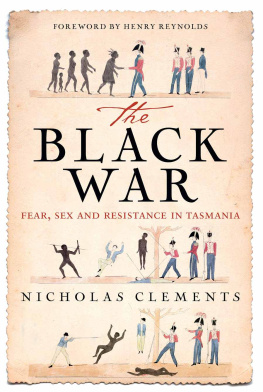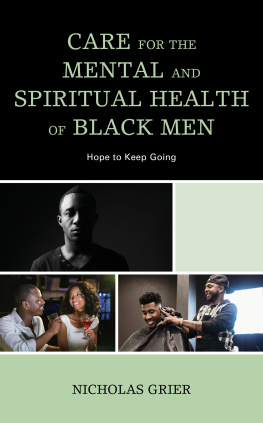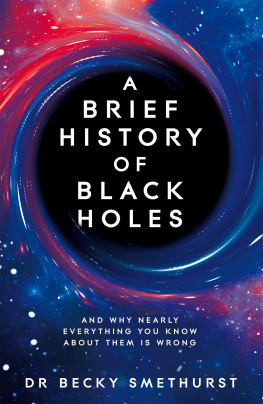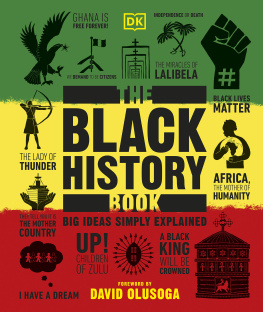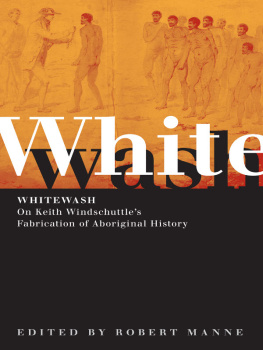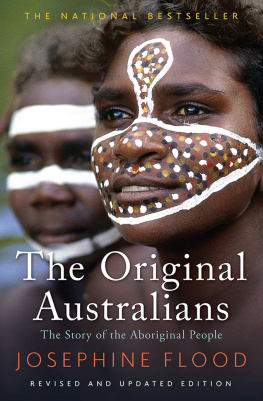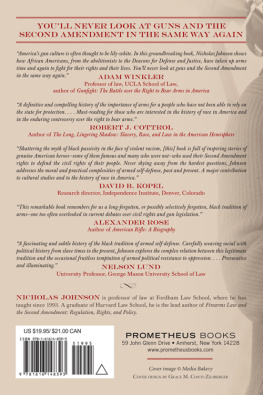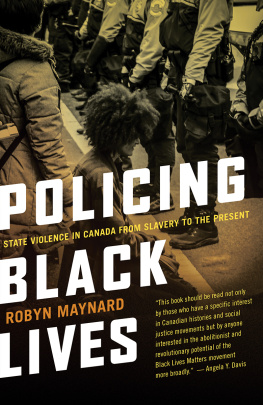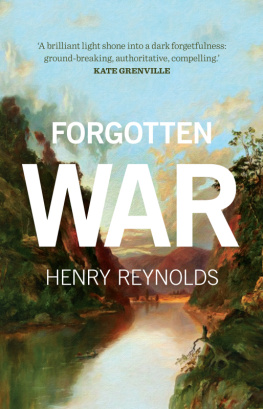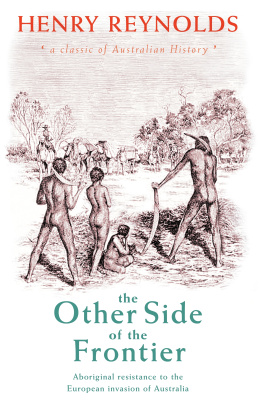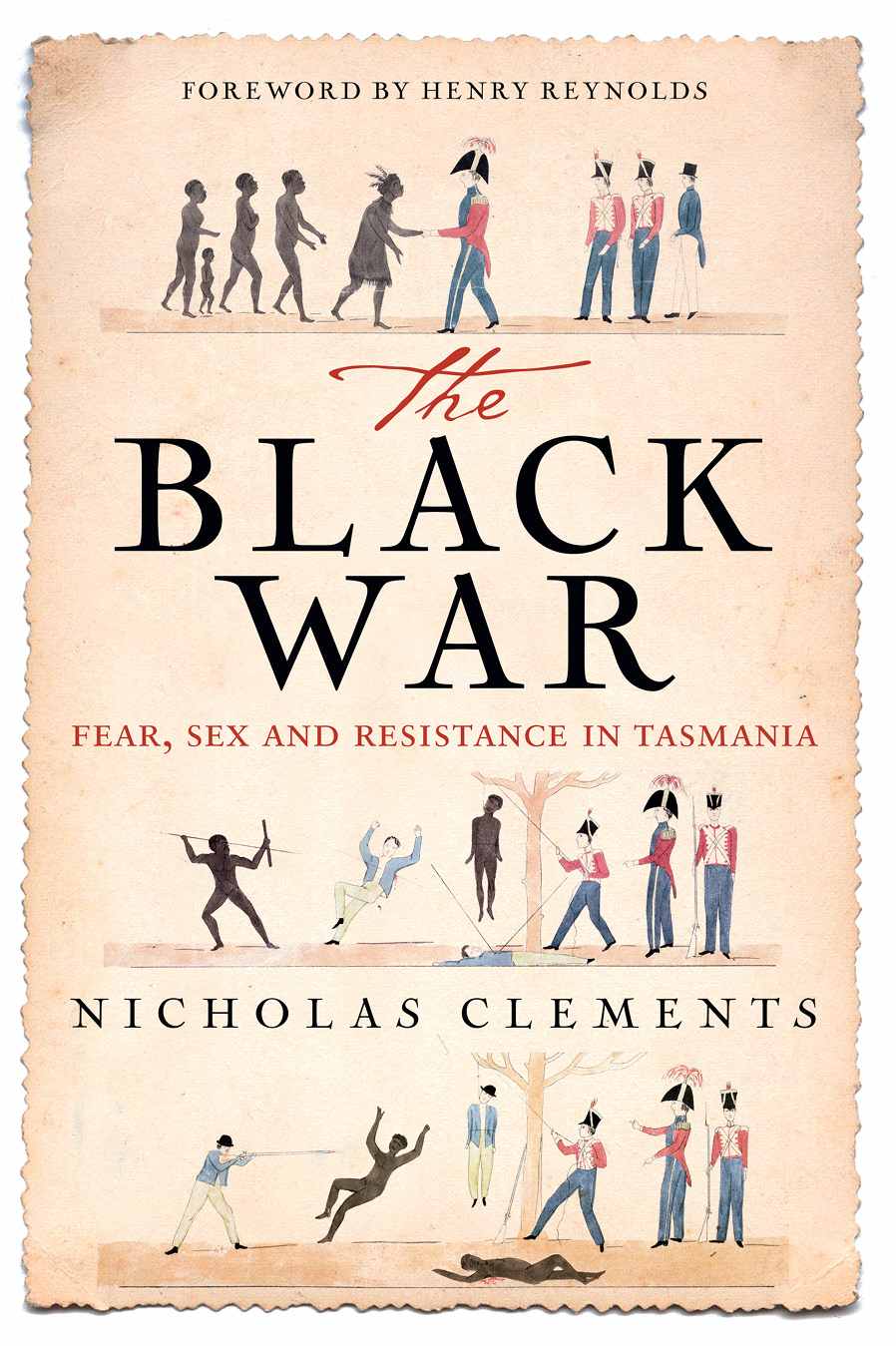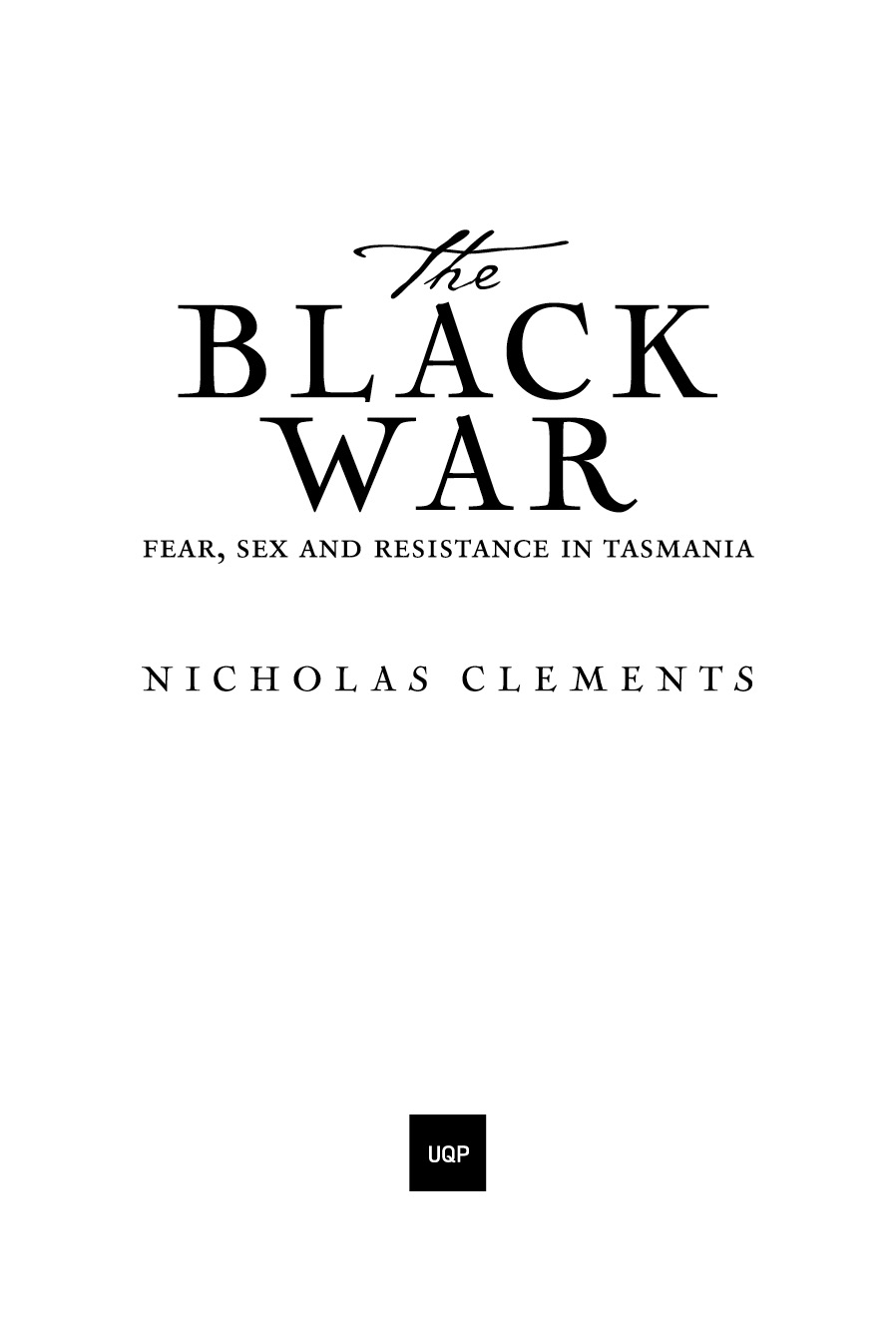Dr Nicholas Clements is an honorary research associate in the School of Humanities at the University of Tasmania. Born in rural Tasmania in 1982, he now lives in Launceston. Nick is an avid rock climber and bushwalker whose passion for Tasmanias landscape and history inspired him to write The Black War.
For my mother and father
CONTENTS
FOREWORD
The tragic history of the Tasmanian Aborigines has been one of the most enduring themes of Australian history, the subject of books, articles, theses, novels and films. European fascination with the Tasmanians can be traced back to exploring expeditions that visited the Island before the first permanent settlement in 1803. French expeditions of 1796 and 1802 left engaging accounts of the traditional life of the bands inhabiting the south-east coast on the eve of the British invasion. European interest persisted throughout the 19th century, stimulated by a series of linked misconceptions. The Tasmanians were regarded as the most primitive people in the world, representing the early childhood of the human race, a benchmark from which advancing evolution could be measured. The death of Trugannini in 1876 was widely regarded as an event of global significance. It was thought, quite erroneously, that the Tasmanians were a distinctive race of which she was the last surviving member. Here was the one clearly documented case of the extinction of a whole race of people, an event that appeared to confirm the all-conquering contemporary theory of evolution.
Historians were drawn to the subject as well. Since the 1830s they have investigated the relations between the Island tribes and the British invaders. In every decade since then the tragic story has been retold with varying degrees of originality and artistry; there has been much repetition and retailing of well-worn stories. But there has been quality as well as quantity. Colonial Tasmanians left us a rich historiographical heritage. Particularly notable were the works by John West, James Calder and James Bonwick, published between 1852 and 1870. Many writers continued to be drawn to the subject in the 20th century, and in the early years of the present century Island history became the epicentre for the swirling controversy known as the history wars.
Two traditions of history clashed. The first reflected the common outlook of the first 60 years of the 20th century the emphasis was on the benign nature of Australian colonisation, which advanced with little conflict, and when it did occur the Aborigines were often to blame. The rapid continent-wide decline of the indigenous population was attributed to introduced diseases rather than to frontier conflict, which it was believed never amounted to a state of warfare. The contending tradition emerged from the work of a generation of revisionist historians writing in the last 25 years of the 20th century. They returned to attitudes that had been common in the 19th century and emphasised the violence inherent in the whole colonial project. They saw frontier conflict as a form of warfare and attempted to provide an account for the consequent loss of life.
Nicholas Clements has written a book that, while reflecting upon the history wars, has transcended their angry contention and has, consequently, brought them to an end. In itself that is a significant achievement. He has also written a book that compares favourably with any other work in the field written in the last 150 years. He has achieved this by great depth of scholarship and by the forensic power of his interpretations, placing many of the controversial questions of the history wars beyond the reach of reasonable doubt.
Clements has reaffirmed the deep seriousness of the Black War and illustrated with abundant evidence the impact of the conflict on black and white alike, and on the whole of Tasmanian society. Perhaps the most striking conclusion is the extraordinary vigour of Aboriginal resistance, which was far more effective than anything of the kind seen on mainland Australia. This can be partly explained by the rugged mountainous terrain, which was ideal for guerrilla warfare, and by the inadequacies of the European muskets. But a major influence on the conflict was the fact that the overwhelming majority of Europeans out on the frontiers of settlement were assigned convicts forced to work in dangerous situations that free labourers would have avoided. They were usually unarmed, on foot and rarely had access to horses.
Nicholas has great empathy for both the beleaguered Aboriginal bands and the hapless convict workers. He is remarkably even-handed, avoiding the partisanship that has characterised and diminished much of previous scholarship. He concentrates instead on the tragedy that engulfed black and white alike; with a compassionate eye he sees the convict workers as unwilling victims of the Imperial project. And that is entirely apt. Nick is an eighth generation Tasmanian, descended from convicts, one of whom arrived in northern Tasmania in 1804 with the first expedition to establish the settlement on the Tamar River. His ancestors lived through and participated in the conflict of the 1820s.
The Black War is an account of a short period in Tasmanian history. But it is an important book for the whole of Australia and for anyone with an interest in our national story.
Henry Reynolds
PREFACE
I cannot recall ever learning about the Black War when I attended high school in Tasmania in the mid-1990s. I remember vividly the Greeks and the Romans, Captain Cook and the First Fleet, Ned Kelly and Gallipoli, but the frontier conflict that raged across the island of my birth was never discussed. My first real encounter with this event came when I won a scholarship to do my Honours project on Aboriginal representation in Tasmanias colonial newspapers. What I found shocked me. How could an event such as the Black War go so unnoticed? We can be sure that, if it had taken place in the United States, every school child would learn about it, artists and filmmakers would re-create it, and it would be an integral part of the national narrative. The patriotism that Americans are famous for is built upon a curious symbiosis of the good and the bad aspects of their history. Australians, on the other hand, are much more ambivalent about the skeletons in their national closet. The cultural brokers of the last century have led Australians to graze contentedly on a lean historical diet of national triumphs, sporting heroes and rural battlers.
I finished my Honours in 2007, but I was only getting started with the Black War. When Professor Henry Reynolds suggested I expand the project into a PhD, I jumped at the chance. The top-down histories had already been written, but as I surveyed the literature on the war, a gaping hole became apparent: Where were the social histories? No one had yet looked seriously at the attitudes or experiences of the colonists, let alone of the Aborigines. This would be my niche, I thought, but one problem lingered: How was I to weave the vastly different experiences of Aborigines and colonists into one volume?
The answer came to me on a rainy afternoon in 2008, as I sheltered in my one-man tent somewhere in rural Serbia. I had taken a gap year to explore the British archives and vent what remained of my youthful exuberance by riding a motorbike solo around Europe. On this particular day I prepared a modest feast of packet-pasta under the cover of my vestibule, and settled in to begin reading the last of my books: The Palestine-Israeli conflict: a beginners guide . The format immediately caught my attention. Half was written by an Israeli scholar and the other half by a Palestinian scholar. Like most left-leaning students, I was an uncritical Palestinian sympathiser, who had learnt to demonise the oppressive, land-hungry Israelis. But now, reading it from both sides, a basic fact of psychology dawned on me almost everybody believes they are a good person and that their actions are justified. From this angle, the traditional dichotomies of right and wrong, good and evil simply miss the point. Both Israelis and Palestinians are caught up in extraordinary circumstances, and both believe they have God and justice on their side. The books format raised my consciousness of the issues, and helped me empathise with both sides. What is more, I now saw plainly that moral judgment was unhelpful, and that understanding the conflict meant first understanding the psychology of those involved.

